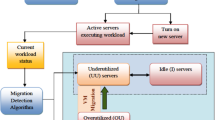Abstract
In this paper, we propose and evaluate a server consolidation approach for efficient power management in virtualized federated Data Centers. The main goal of our approach is to reduce power consumption, trying to meet QoS requirements with limited energy defined by a third party agent. In our model, we address application workload considering the costs due to turning servers on/off and Virtual Machine migrations in same Data Center and between different Data Centers. Our simulation results with 2 data centers and 400 simultaneous Virtual Machines show that our approach is able to reduce more than 50% of energy consumption, while still meeting the QoS requirements.
Access this chapter
Tax calculation will be finalised at checkout
Purchases are for personal use only
Preview
Unable to display preview. Download preview PDF.
Similar content being viewed by others
References
Beloglazov, A., et al.: A taxonomy and survey of energy-efficient data centers and cloud computing systems. Advances in Computers 82, 49 (2010)
Buyya, R., et al.: Cloud computing and emerging it platforms: Vision, hype, and reality for delivering computing as the 5th utility. Future Gener. Comput. Syst. 25, 599–616 (2009)
Calheiros, R.N., et al.: Cloudsim: a toolkit for modeling and simulation of cloud computing environments and evaluation of resource provisioning algorithms. Software: Practice and Experience 41(1), 23–50 (2011)
Chen, Y., Yeh, H.: An implementation of the multiagent system for market-based cloud resource allocation. J. Computing 2(11), 27–33 (2010)
Das, R., et al.: Autonomic multi-agent management of power and performance in data centers. In: AAMAS, pp. 107–114 (2008)
Ejarque, J., Sirvent, R., Badia, R.M.: A multi-agent approach for semantic resource allocation. In: CloudCom, pp. 335–342 (December 2010)
Ferreto, T.C., et al.: Server consolidation with migration control for virtualized data centers. Future Gener. Comput. Syst. 27(8), 1027–1034 (2011)
Fan, X., Weber, W., Barroso, L.A.: Power provisioning for a warehouse-sized computer. In: ISCA, pp. 13–23. ACM (2007)
Ferreira, A., et al.: Energy-aware design of service-based applications. In: ISOCC, pp. 99–114 (2009)
Hayes, B.: Cloud computing. Commun. ACM 51, 9–11 (2008)
Hoelzle, U., Barroso, L.A.: The Datacenter as a Computer: An Introduction to the Design of Warehouse-Scale Machines. M. C. Pub. (2009)
Kim, K.H., et al.: Sla-based scheduling of bag-of-tasks applications on power-aware cluster systems. IEICE Trans. on Inf. Sys. E93-D(12), 3194–3201 (2010)
Kipp, A., Jiang, T., Fugini, M., Salomie, I.: Layered green performance indicators. Future Gener. Comput. Syst. 28(2), 478–489 (2012)
Lee, Y.C., Zomaya, A.Y.: Energy efficient utilization of resources in cloud computing systems. The Journal of Super Computing, 1–13 (2010)
Lefurgy, C., Wang, X., Ware, M.: Server-level power control. In: Fourth Autonomic Computing. IEEE Computer Society (2007)
Shi, Y., Jiang, X., Ye, K.: An energy-efficient scheme for cloud resource provisioning based on cloudsim. In: IEEE ICCC, pp. 595–599 (2011)
Vaquero, L.M., et al.: A break in the clouds: towards a cloud definition. SIGCOMM Comput. Commun. Rev. 39, 50–55 (2008)
Zhang, Q., Gürses, E., Boutaba, R., Xiao, J.: Dynamic resource allocation for spot markets in clouds. In: Hot-ICE 2011, pp. 1–6 (2011)
Author information
Authors and Affiliations
Editor information
Editors and Affiliations
Rights and permissions
Copyright information
© 2013 ICST Institute for Computer Science, Social Informatics and Telecommunications Engineering
About this paper
Cite this paper
Leite, A.F., Magalhaes Alves de Melo, A.C. (2013). Energy-Aware Multi-Agent Server Consolidation in Federated Clouds. In: Yousif, M., Schubert, L. (eds) Cloud Computing. CloudComp 2012. Lecture Notes of the Institute for Computer Sciences, Social Informatics and Telecommunications Engineering, vol 112. Springer, Cham. https://doi.org/10.1007/978-3-319-03874-2_8
Download citation
DOI: https://doi.org/10.1007/978-3-319-03874-2_8
Publisher Name: Springer, Cham
Print ISBN: 978-3-319-03873-5
Online ISBN: 978-3-319-03874-2
eBook Packages: Computer ScienceComputer Science (R0)




